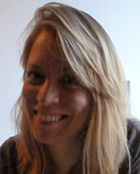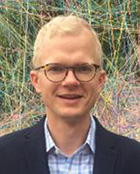Two Marie Skłodowska-Curie Individual Fellowships
The European Commission has granted a European Fellowship to Department of Anthropology and a Global Fellowship to Department of Economics.
About the fellowships
The European Fellowship of EUR 212,194 allows Dr Amy Penfield from University of Manchester to come to Department of Anthropology for a 2-year stay, including 8 months of field research, starting in the autumn of 2017.
Amys abstract for her project WILDCAT
 The proposed project will conduct an ethnographic study of small-scale gold mining in South America, otherwise known as ‘wildcat mining’, and aims to explore the interconnection between formal and informal economic spheres at the global margins.
The proposed project will conduct an ethnographic study of small-scale gold mining in South America, otherwise known as ‘wildcat mining’, and aims to explore the interconnection between formal and informal economic spheres at the global margins.
The project will forge a concept of ‘wildcat economics’: that is, the particular form of small-scale mining that takes place in extremely remote regions of the world essentially 'under the radar', in this case the Amazonian rainforest. As such, WILDCAT will explore forms of globalization that do not comprise direct corporate growth, but emerge from individual ventures, and thus challenges stereotypical renditions of resource extraction and global capitalism. Through this analytical framework, the project provides insights into lesser-understood workings of globalization by offering new ways of conceptualizing the jurisdictions of global capitalism and the economic activities that lie beyond its limits.
Fieldwork will take place in the Madre de Dios region of Peru where wildcat mining activity is clustered, and will draw on methodologies of both anthropology and geography. I will significantly benefit from a placement at the University of Copenhagen as it is one of the key European centers for the study of Resource Extraction and Management. Significantly, Copenhagen University houses the Centre for Sustainable Artisanal and Small-Scale Mining (SASMin), which explores the activities and issues associated with small-scale mining around the world. I will be affiliated with this centre as a researcher representing and bringing insights from the discipline of anthropology.
The Global Fellowship of EUR 260,227 allows postdoc Marc Brag Klemp, Department of Economics, to visit Brown University in USA for two years and an additional 1-year stay back at UCPH.
Marc's project abstract
 Social scientists have long studied the effects of population diversity on society. The research project proposed here breaks new ground in multiple dimensions by rigorously estimating the long-run effects of (i) local population diversity, (ii) individual diversity, and (iii) the interaction between these two concepts, on comparative socioeconomic performance across locations and lineages within a country.
Social scientists have long studied the effects of population diversity on society. The research project proposed here breaks new ground in multiple dimensions by rigorously estimating the long-run effects of (i) local population diversity, (ii) individual diversity, and (iii) the interaction between these two concepts, on comparative socioeconomic performance across locations and lineages within a country.
Through a combination of two extensive high-quality databases covering the complete genealogy of more than five million individuals living in Quebec, spanning its settlement in the 16th century up to present day, as well an immense database covering more than 43 million worldwide individuals, I will analyze the effects of diversity using measures of diversity that are well-established in the field of quantitative genetics. The project will deliver the first within-country long-run investigations involving local and individual diversity.
First, I hypothesize that the diversity of an individual’s ancestors has a significant effect on the productivity of that individual as well as his descendants. In particular, I hypothesize that individuals from more diverse lineages were more capable of adjusting to changing economic conditions, finding new productive niches, and thus raising that individual’s income.
Second, I hypothesize that the negative effects of diversity found on the country level are less operative within a country. Thus, I expect to find that local population diversity has had a monotonically positive effect on long-run development within a country.
Third, I hypothesize that there is an interaction effect between population-level and individual-level diversity. Thus, I suggest
that the effect of individual diversity is affected by the diversity of the locality in which the individual is situated. In particular, I
hypothesize that there is a greater benefit to individual diversity in less diverse localities.
Congratulations with the Marie Curie grants!
Huge Marie Curie success for UCPH
University of Copenhagen received a total of 43 Marie Curie Individual Fellowships.
